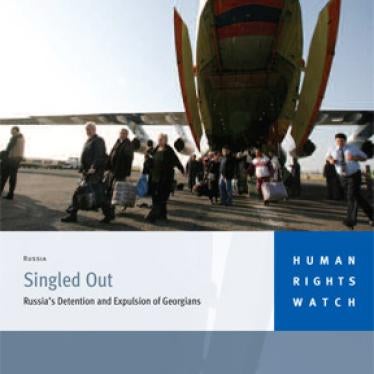The Russian government undertook a deliberate campaign to detain and expel thousands of Georgians living in Russia in October and November 2006, Human Rights Watch said in a report released today.
The 78-page report, “Singled Out: Detention and Expulsion of Georgians,” documents the Russian government’s arbitrary and illegal detention and expulsion of Georgians, including many who legally lived and worked in Russia.
“The Russian authorities claim that the expulsions weren’t targeting Georgians, but were part of the renewed fight against illegal migration,” said Holly Cartner, Europe and Central Asia director at Human Rights Watch. “But in reality, this was a coordinated campaign orchestrated at senior levels of government that singled out Georgians for a specific period.”
Following months of growing political tensions between Russia and Georgia, Georgian officials detained four Russian military officers on September 27, 2006 on charges of espionage. On October 2, Georgia handed the officers over to the Organization for Security and Cooperation in Europe (OSCE), and in the days and weeks that followed Russian authorities began a widespread crackdown on ethnic Georgians, Georgian nationals, and Georgian-owned or Georgian-themed businesses and organizations.
Russian government agencies issued written orders instructing police, the Federal Migration Service, courts and other agencies to take the necessary actions to identify and expel Georgians living irregularly in Russia. Senior government officials disparaged Georgians openly on government-owned TV, and much of Russia’s government-friendly TV and other media followed suit.
Police and other authorities denied basic rights to many of the detained. Most were denied lawyers or access to Georgian embassy officials, and were given hearings lasting only a few minutes. Many were held in severely overcrowded cells and in sometimes appalling conditions during detention. Two Georgians died in custody awaiting expulsion.
“Human Rights Watch recognizes governments’ right to control illegal migration, but all migrants, including irregular migrants, have rights, which must be respected,” said Cartner.
Russia is home to an estimated 13-20 million migrants, the majority of whom come from countries of the former Soviet Union seeking better economic opportunities. They are similarly vulnerable to the risk of reprisals should political tensions escalate between Moscow and migrants’ home countries.
“The government’s willingness to single out an ethnic group for expulsion as a foreign policy tactic is worrisome,” said Cartner. “It suggests that Russia will interrupt peoples’ lives in order to serve foreign policy interests.”
The Russian government’s campaign against Georgians occurred in the context of pervasive racism and xenophobia in Russia. Violent racially-motivated attacks and murders have become common occurrences, especially in large cities. Although there have been some convictions, the Russian government has done little to combat these dangerous trends. Racism also manifests itself in discrimination by employers, landlords, shopkeepers and others, and in racial-profiling by police.
The campaign against Georgians coincided with the government’s passage of new migration policies, including a restriction on foreigners working in certain positions in the nation’s retail markets. The authorities have organized sweeps to seek out migrants living or working without authorization. Most recently, on September 15, 2007, the Russian Federal Migration Service enlisted members of the nationalist, pro-Kremlin youth group Mestnye (Locals) to seek out and detain migrants, whom they alleged were working illegally at Moscow’s busy Yaroslavskii market. In May of this year, Mestnye activists led protests against the Estonian Embassy following Russia’s protest of Estonia’s removal of a Soviet war memorial.
“The Russian government is engaged in some questionable practices in the name of fighting illegal migration,” said Cartner. “The EU and other governments should insist that Russia ensure that migrants are not targeted arbitrarily and the rights of migrants at all times be respected.”







